#science fiction review
Explore tagged Tumblr posts
Text

Science Fiction Review magazine #37, April 1970.
Cover art: Jim McLeod
#science fiction#magazine#fanzine#Science Fiction Review#Jim McLeod#Richard E. Geis#Brian Aldiss#Piers Anthony#USA#1970
35 notes
·
View notes
Text
Review: Graphic Audio – Fugitive Telemetry by Martha Wells
Series: The Murderbot Diaries #6Author: Martha Wells Find it on Goodreads | Graphic Audio | More Murderbot Graphic Audio Review Wow, I can’t believe Graphic Audio is almost caught up with The MurderBot Diaries already! (Side note: what should I listen to next?). Fugitive Telemetry is the sixth novella in the series. It’s also the first one that’s set on Preservation Station. Yeah, it’s…
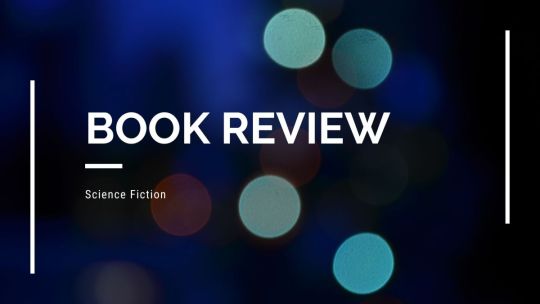
View On WordPress
#Book#Book Box#Book Review#Books#Fiction#Fugitive Telemetry#Fugitive Telemetry by Martha Wells#Graphic Audio#Literary#Literature#Martha Wells#Review#Science Fiction#Science Fiction Review#The Murderbot Diarie#The Murderbot Diaries#The Murderbot Diaries 6
6 notes
·
View notes
Text
Mune - Ein Faun rettet seine Welt (Teil 1)
von KIP SUPERNOVA
"Man erzählt sich, dass zu Beginn die Welt dunkel und kalt war. Ein super starker Mann - der erste Wächter der Sonne - fing die Sonne ein, und zog sie zu unserem Planeten heran, sodass fortan Licht und Wärme herrschten. Der erste Wächter des Mondes brachte den Mond selbst aus dem Reich der Träume, und mit ihm die Nacht und die Träume in die Welt. Fortan stehen Tag und Nacht im Gleichgewicht auf unserem Planeten."
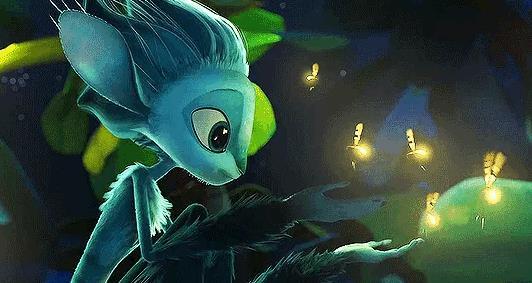
Bild: On Animation Studios / Paramount Pictures
So beginnt der traumhaft schöne Film "Mune - Der Wächter des Mondes" unter der Regie von Alexandre Heboyan und Benoît Philippon, produziert von On Animation Studios und Paramount Pictures. Seine Kino Premiere hatte "Mune" am 6. Dezember 2014 und ist wahrlich der ideale Film für die Vorweihnachtszeit, denn er entführt uns in eine Welt, die auf einem kleinen Planeten spielt, auf dem allerhand seltsamer Wesen leben.
Die Geschichte Die "alten" Wächter der Sonne und des Mondes übergeben ihr Zepter an ihre Nachfolger: Sohone und Leeyoon. Sohone aus dem Volk des "Tages" ist ein muskulöser, ehrgeiziger Athlet, der vor allem mit seiner Körperkraft und dem lässigen Auftreten die weiblichen "Fans" beeindrucken möchte. Leeyoon, ein kühles, ernsthaftes Wesen, das entfernt an ein Alpaka oder Lama erinnert, hat "jahrelang" für diesen Augenblick trainiert und studiert.
Während dieser historischen Zeremonie lernen wir auch Glim kennen: Genau wie ihr Vater ist Glim ein "Wesen der Dämmerung": Ihr Körper ist aus einer Art Wachs, das im direkten Sonnenlicht schmilzt, und in der Nacht erstarrt. Glim kann sich deshalb immer nur im Zwielicht aufhalten. Als begeisterter Astronomie-Fan wohnt sie dem Ereignis, an dem die neuen Wächter von Sonne und Mond ernannt werden, bei (und sitzt genau zwischen den Tag- und den Nachtwesen.
Eines der Nachtwesen, die zum größten Teil aus Faunen besteht, ist Mune. Mune hat blaues Fell, ein sehr gütiges und sanftes Gemüt und besitzt die Fähigkeit, böse Träume zu vertreiben und andere Wesen einen ruhigen, friedvollen Schlaf zu bescheren.
Während der Zeremonie "entscheidet sich der Mond" gegen Leeyon und für Mune als neuen Wächter des Mondes - zur großen Überraschung aller! - denn alle Faune - auch sein Vater - sind stets genervt von Munes ungeschickten Verhalten.
Da er sich verraten und unfair behandelt fühlt, ist Leeyoon empfänglich für die "bösen Alptraumschlangen", die ihm einreden, dass er seinen "rechtmäßigen Platz als Wächter des Mondes" verdient hätte und "dieser blauen Ratte Mune" wieder entreißen müsse. Dazu müsse er nur Sohone die Sonne stehlen und Necross, dem Herr der Unterwelt überlassen.
Blind vor Wut und der Verführung des Bösen führt Leeyoon den teuflischen Plan aus und verschafft den Dämonen Mox und Spleen Zugang zum Sonnentempel, wo die Dämonen die Sonne stehlen und Necross bringen.
Mune, völlig überfordert von seiner neuen Aufgabe, steuert den Mondtempel völlig chaotisch über den Planeten, bringt das Gleichgewicht von Tag und Nacht durcheinander und verliert schließlich um ein Haar den Mond!
In diesem Augenblick reißt Leeyoon sich seinen Posten als Mondwächter an sich; Mune läuft traurig und enttäuscht weg, Sohone stellt fest, dass die Sonne weg ist und aus Mune, Sohone und Glim, die zu ihnen stößt, wird eine Fellowship unterschiedlichster Persönlichkeiten, die sich in die Unterwelt begibt, um die Sonne zu retten und sich dem böse Necross zu stellen …
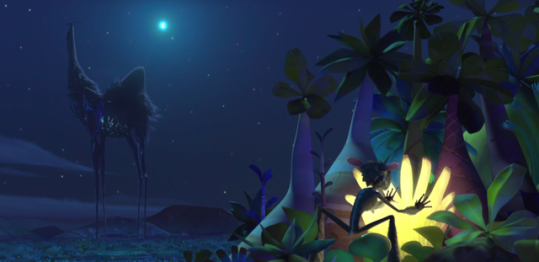
Bild: On Animation Studios / Paramount Pictures
Die Charaktere und ihre Eigenarten Bereits sehr früh wird deutlich, dass die Bewohner der Planeten spezielle Fähigkeiten besitzen: So kann Mune wie bereits erwähnt Träume und Schlaf beeinflussen, Sohone besitzt außergewöhnliche, körperliche Fähigkeiten und Glim ein beeindruckendes Wissen über Astronomie sowie den Lehren der "Bücher der Ahnen".
Die Bevölkerung des Planeten setzt sich aus einer Mischung aus Wesen zusammen, die beispielsweise auf der "Tagseite" (in der es aber auch Nacht wird und umgekehrt) humanoiden Reptilien ähneln, deren Körper jedoch aus Erde oder Gestein zu bestehen scheinen. Die "Dämmerwesen" wie beispielsweise Glim und ihr Vater sind humanoid und bestehen aus einer Art Wachs. Auf der Nachtseite (in der es aber auch Tag wird) leben Faune, Alpaka ähnliche humanoide Wesen sowie Tiere die wie Schafe aussehen in üppigen Wäldern, die an die Welt von Pandora aus "Avatar" erinnern. Vor allem die Faune besitzen besondere Fähigkeiten: Sie können in der Nacht leuchtende Blumen wachsenen lassen, Schwärme von Glühwürmchen steuern und wie Mune schlafenden Wesen eine ruhige Nacht spenden.
Die Fähigkeiten der Wächter werden durch ihren Eintritt als Sonne- bzw. Mondwächter um ein Vielfaches dann verstärkt, was an Superkräfte erinnert: Sohone wird durch die Kraft der Sonne quasi eine Art Superman, der über unglaubliche, körperliche Stärke verfügt, Mune wird zum "Dreammaster": Ihm gelingt es nämlich am Ende Necross einfach "schlafen" zu legen, in seinen Traum einzusteigen und dort die bösen Dämonen, die Necross vergiftet haben, zu zerstören.
Phospho, ein ehemaliger Wächter des Mondes (ein Wesen, das an einen Manta-Rochen erinnert) besitzt immer noch die Fähigkeit, einen Teil seiner Lebensenergie auf andere Wesen zu übertragen und somit ihr Leben zu retten.

Bild: On Animation Studios / Paramount Pictures
Die "Physik" des Planeten Dass der Planet in "Mune" sehr klein ist, dass die Himmelsobjekte Mond und Sonne ebenfalls in ihrer Größe (etwa so groß wie ein Medizinball) geradezu lächerlich für aufrechte Physik- und Astronomiefans rüberkommen, muss nicht diskutiert werden. Denn der Film entführt uns von Anfang an in eine Welt, in der eigene physikalische Regeln gelten: In ein Märchen. Sowohl optisch als auch erzählerisch befinden wir uns weder in einem Fantasyfilm, noch in einer Science Fiction Geschichte, sondern in einem Märchen-Bilderbuch, wo die gegebenen Gesetze und ihre Welt akzeptiert und nicht hinterfragt werden.
Besonders faszinierend wird hier der "Sprung der Dimensionen" - sowohl erzählerisch als auch optisch, denn als Mune mit Glim zusammen das Reich der Träume betritt, um einen neuen Mond zu holen, werden wir von der 3D Computeranimation in eine 2D Zeichentrickwelt katapuliert.
Auf dem Planeten bringt der Mond "Licht in die finstre Nacht" und versorgt auch die Wesen der Nacht, wie die Faune, mit Energie, damit diese den schlafenden Wesen angenehme Träume bescheren können. Die Sonne bringt Licht und Wärme und somit Wachstum und Lebensfreude. Es ist quasi das "Ying und Yang" am Himmel: Leben und Wachstum am Tage, Ruhe und Frieden in der Nacht.
Welche Aufgaben haben die Wächter? Wie der Name schon sagt, sorgen die Wächter dafür, dass dieses Gleichgewicht auf der Welt eingehalten wird: Die Sonne wie der Mond dürfen sich nicht zu langsam und nicht zu schnell bewegten. Gesteuert wird ihre Bewegung durch die "Tempel" - dies sind gigantische Tiere, die den Mond bzw. die Sonne hinter sich herziehen. Die Wächter wohnen auf diesen Tempeln und steuern die Himmelsobjekte. Während der "Sonnentempel" an einen riesigen, steinernen Dinosaurier erinnert, mutet der "Mondtempel" wie ein riesiges, schwarzes Kamel an.
Da der Film "Mune" eine sehr vielseitige Welt zeigt, möchte ich meine Ausführungen zu dem Film in einem nächsten Blog fortsetzen, wo ich auf die Produktion des Films und am Ende auf mein persönliches Fazit dann näher eingehen möchte.
11 notes
·
View notes
Photo
* * * *
"A witch didn't do things because they seemed like a good idea at the time! That was practically cackling! You had to deal everyday with people who were foolish and lazy and untruthful and downright unpleasant, and you could certainly end up thinking that the world would be considerably improved if you gave them a slap. But you didn't because, as Miss Tick once explained: a) it would make the world a better place for only a very short time; b) it would then make the world a slightly worse place; and c) you're not supposed to be as stupid as they are."
-- Terry Pratchett, Wintersmith [Thanks to Beth Fowler]
[alive on all channels]

Stephen Fabian, “Science Fiction Review”, #41, 1981 Source
346 notes
·
View notes
Text
The Man Who Ruined Science Fiction (part 3)
Roger Elwood’s own editorial ineptitude plus the fact he stretched himself too thin undercut the potential of the Laser Books line.
The packaging looked superb, each cover painted by legendary sci-fi artist Frank Kelly Freas featuring a cameo head portrait of that book’s central character with a background element indicating what the story would be about. A distinctive logo that couldn’t be easily swiped by competitors, enough marketing muscle to get the books out to the readers.
What could possibly go worng?
In a word: Elwood.
Here’s the hidden clue I hinted out throughout these posts: Elwood saw himself as a devout Christian.
Before anyone raises a sneery lip at that, let the record show being a devout Christian does not impair the genuine artist.
It’s not necessarily a benefit, but it needn’t be an impediment.
Ray Bradbury springs to mind, as good a Christian as one could hope to meet, but certainly not a prude and certainly not morally judgmental.
Which by all accounts are two traits deeply engrained in the late Roger Elwood.
While Elwood certainly enjoyed science fiction and fantasy, his personal religious code worked against him embracing the more challenging examples of the genre, especially in the middle of the aforementioned Old Thing vs. New Wave debate.
To his credit, Elwood wanted to promote works that reflected his moral values, and he appeared open and above board in that aspect.
But this also blocked him from writers who would challenge those sensibilities.
He might still have pulled it off and established Laser Books as a respected line in the field, but his over-eager ambition led him to accept far too many substandard works while his editorial policies led him to drastically revise more than a few novels that were latter reprinted as intended to much better acclaim.
A lot of Laser’s material appeared to be trunk novels that sat gathering dust in a desk drawer for well over a decade. I remember reviewing one for Dick Geis’ Science Fiction Review, going at it hammer and tong for the blatant and ugly 1930s racial stereotypes permeating it.
He asked me why I went after a gnat with an elephant gun.
By 1977 Elwood suffered his third strike in science fiction and slunk off into Christian publishing, writing 30 some novels between 1988 and 2001 (plus a posthumous book in 2011).
It is a testimony to his impact in the field that during the time I packaged the Serenity graphic novels for the Christian book market, nobody ever mentioned his name or his books, much less held them up as examples of what to strive for.
Now, I bear no personal grudge against the man, never meeting him or sharing any direct communication with him.
But I do recognize similarities and differences between us.
© Buzz Dixon
1 note
·
View note
Text
The Fountains of Paradise - Classic Sci-fi Novel Review
New review, this time classic Arthur C. Clarke. Thanks for checking it out.
Author: Arthur C. Clarke Publisher: Gollancz Country: UK Year: 1979 What was intended to be Clarke’s last science-fiction novel (yeah, that went well) is tight, snug, and cosily familiar. There’s something about a Clarke novel that does that; one of the reasons why I love his work every time I get around to ploughing through a few pages. In this novel, a scientist and engineer plans to use a…

View On WordPress
#arthur c clarke book review#arthur c clarke review#classic science fiction#fountains of paradise#fountains of paradise arthur c clarke#fountains of paradise book review#fountains of paradise novel#fountains of paradise review#literature reveiw#literature review#science fiction book review#science fiction review#scifi book review#scifi novel review#scifi review#scifi#science fiction#sci fi#review#book review
0 notes
Text
Sandra Newman’s “Julia”

The first chapter of Orwell's Nineteen Eighty-Four has a fantastic joke that nearly everyone misses: when Julia, Winston Smith's love interest, is introduced, she has oily hands and a giant wrench, which she uses in her "mechanical job on one of the novel-writing machines":
https://gutenberg.net.au/ebooks01/0100021.txt
That line just kills me every time I re-read the book – Orwell, a novelist, writing a dystopian future in which novels are written by giant, clanking mechanisms. Later on, when Winston and Julia begin their illicit affair, we get more detail:
She could describe the whole process of composing a novel, from the general directive issued by the Planning Committee down to the final touching-up by the Rewrite Squad. But she was not interested in the finished product. She 'didn't much care for reading,' she said. Books were just a commodity that had to be produced, like jam or bootlaces.
I always assumed Orwell was subtweeting his publishers and editors here, and you can only imagine that the editor who asked Orwell to tweak the 1984 manuscript must have felt an uncomfortable parallel between their requests and the notional Planning Committee and Rewrite Squad at the Ministry of Truth.
I first read 1984 in the early winter of, well, 1984, when I was thirteen years old. I was on a family trip that included as visit to my relatives in Leningrad, and the novel made a significant impact on me. I immediately connected it to the canon of dystopian science fiction that I was already avidly consuming, and to the geopolitics of a world that seemed on the brink of nuclear devastation. I also connected it to my own hopes for the nascent field of personal computing, which I'd gotten an early start on, when my father – then a computer science student – started bringing home dumb terminals and acoustic couplers from his university in the mid-1970s. Orwell crystallized my nascent horror at the oppressive uses of technology (such as the automated Mutually Assured Destruction nuclear systems that haunted my nightmares) and my dreams of the better worlds we could have with computers.
It's not an overstatement to say that the rest of my life has been about this tension. It's no coincidence that I wrote a series of "Little Brother" novels whose protagonist calls himself w1n5t0n:
https://craphound.com/littlebrother/Cory_Doctorow_-_Little_Brother.htm
I didn't stop with Orwell, of course. I wrote a whole series of widely read, award-winning stories with the same titles as famous sf tales, starting with "Anda's Game" ("Ender's Game"):
https://www.salon.com/2004/11/15/andas_game/
And "I, Robot":
https://craphound.com/overclocked/Cory_Doctorow_-_Overclocked_-_I_Robot.html
"The Martian Chronicles":
https://escapepod.org/2019/10/03/escape-pod-700-martian-chronicles-part-1/
"True Names":
https://archive.org/details/TrueNames
"The Man Who Sold the Moon":
https://memex.craphound.com/2015/05/22/the-man-who-sold-the-moon/
and "The Brave Little Toaster":
https://archive.org/details/Cory_Doctorow_Podcast_212
Writing stories about other stories that you hate or love or just can't get out of your head is a very old and important literary tradition. As EL Doctorow (no relation) writes in his essay "Genesis," the Hebrews stole their Genesis story from the Babylonians, rewriting it to their specifications:
https://www.penguinrandomhouse.com/books/41520/creationists-by-e-l-doctorow/
As my "famous title" stories and Little Brother books show, this work needn't be confined to antiquity. Modern copyright may be draconian, but it contains exceptions ("fair use" in the US, "fair dealing" in many other places) that allow for this kind of creative reworking. One of the most important fair use cases concerns The Wind Done Gone, Alice Randall's 2001 retelling of Margaret Mitchell's Gone With the Wind from the perspective of the enslaved characters, which was judged to be fair use after Mitchell's heirs tried to censor the book:
https://en.wikipedia.org/wiki/Suntrust_Bank_v._Houghton_Mifflin_Co.
In ruling for Randall, the Eleventh Circuit Court of Appeals emphasized that she had "fully employed those conscripted elements from Gone With the Wind to make war against it." Randall used several of Mitchell's most famous lines, "but vest[ed] them with a completely new significance":
https://law.justia.com/cases/federal/appellate-courts/F3/268/1257/608446/
The Wind Done Gone is an excellent book, and both its text and its legal controversy kept springing to mind as I read Sandra Newman's wonderful novel Julia, which retells 1984 from the perspective of Julia, she of the oily hands the novel-writing machine:
https://www.harpercollins.com/products/julia-sandra-newman?variant=41467936636962
Julia is the kind of fanfic that I love, in the tradition of both Wind Done gone and Rosenkrantz and Gildenstern Are Dead, in which a follow-on author takes on the original author's throwaway world-building with deadly seriousness, elucidating the weird implications and buried subtexts of all the stuff and people moving around in the wings and background of the original.
For Newman, the starting point here is Julia, an enigmatic lover who comes to Winston with all kinds of rebellious secrets – tradecraft for planning and executing dirty little assignations and acquiring black market goods. Julia embodies a common contradiction in the depiction of young women (she is some twenty years younger than Winston): on the one hand, she is a "native" of the world, while Winston is a late arrival, carrying around all his "oldthink" baggage that leaves him perennially baffled, terrified and angry; on the other hand, she's a naive "girl," who "doesn't much care for reading," and lacks the intellectual curiosity that propels Winston through the text.
This contradiction is the cleavage line that Newman drives her chisel into, fracturing Orwell's world in useful, fascinating, engrossing ways. For Winston, the world of 1984 is totalitarian: the Party knows all, controls all and misses nothing. To merely think a disloyal thought is to be doomed, because the omnipotent, omniscient, and omnicompetent Party will sense the thought and mark you for torture and "vaporization."
Orwell's readers experience all of 1984 through Winston's eyes and are encouraged to trust his assessment of his situation. But Newman brings in a second point of view, that of Julia, who is indeed far more worldly than Winston. But that's not because she's younger than him – it's because she's more provincial. Julia, we learn, grew up outside of the Home Counties, where the revolution was incomplete and where dissidents – like her parents – were sent into exile. Julia has experienced the periphery of the Party's power, the places where it is frayed and incomplete. For Julia, the Party may be ruthless and powerful, but it's hardly omnicompetent. Indeed, it's rather fumbling.
Which makes sense. After all, if we take Winston at his word and assume that every disloyal citizen of Oceania is arrested, tortured and murdered, where would that leave Oceania? Even Kim Jong Un can't murder everyone who hates him, or he'd get awfully lonely, and then awfully hungry.
Through Julia's eyes, we experience Oceania as a paranoid autocracy, corrupt and twitchy. We witness the obvious corollary of a culture of denunciation and arrest: the ruling Party of such an institution must be riddled with internecine struggle and backstabbing, to the point of paralyzed dysfunction. The Orwellian trick of switching from being at war with Eastasia to Eurasia and back again is actually driven by real military setbacks – not just faked battles designed to stir up patriotic fervor. The Party doesn't merely claim to be under assault from internal and external enemies – it actually is.
Julia is also perfectly positioned to uncover the vast blank spots in Winston's supposed intellectual curiosity, all the questions he doesn't ask – about her, about the Party, and about the world. I love this trope and used it myself, in Attack Surface, the third "Little Brother" book, which is told from the point of view of Marcus's frenemy Masha:
https://us.macmillan.com/books/9781250757531/attacksurface
Through Julia, we come to understand the seemingly omniscient, omnipotent Party as fumbling sadists. The Thought Police are like MI5, an Island of Misfit Toys where the paranoid, the stupid, the vicious and the thuggish come together to ruin the lives of thousands, in such a chaotic and pointless manner that their victims find themselves spinning devastatingly clever explanations for their behavior:
https://www.bbc.co.uk/blogs/adamcurtis/entries/3662a707-0af9-3149-963f-47bea720b460
And, as with Nineteen Eighty-Four, Julia is a first-rate novel, expertly plotted, with fantastic, nail-biting suspense and many smart turns and clever phrases. Newman is doing Orwell, and, at times, outdoing him. In her hands, Orwell – like Winston – is revealed as a kind of overly credulous romantic who can't believe that anyone as obviously stupid and deranged as the state's representatives could be kicking his ass so very thoroughly.
This was, in many ways, the defining trauma and problem of Orwell's life, from his origin story, in which he is shot through the throat by a fascist: sniper during the Spanish Civil War:
https://www.rjgeib.com/thoughts/soldiers/george-orwell-shot.html
To his final days, when he developed a foolish crush on a British state spy and tried to impress her by turning his erstwhile comrades in to her:
https://en.wikipedia.org/wiki/Orwell%27s_list
Newman's feminist retelling of Orwell is as much about puncturing the myth of male competence as it is about revealing the inner life, agency, and personhood of swooning love-interests. As someone who loves Orwell – but not unconditionally – I was moved, impressed, and delighted by Julia.

Tor Books as just published two new, free LITTLE BROTHER stories: VIGILANT, about creepy surveillance in distance education; and SPILL, about oil pipelines and indigenous landback.
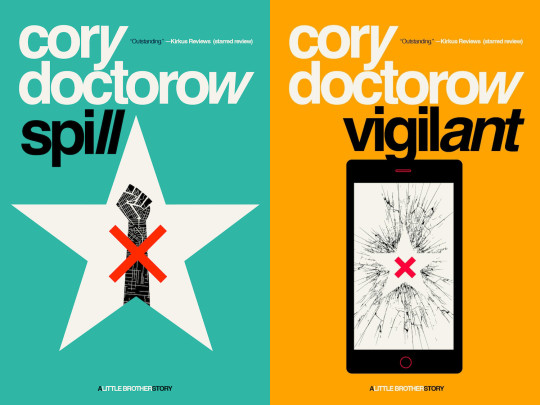

If you'd like an essay-formatted version of this post to read or share, here's a link to it on pluralistic.net, my surveillance-free, ad-free, tracker-free blog:
https://pluralistic.net/2024/09/28/novel-writing-machines/#fanfic
#pluralistic#reviews#books#orwell#george orwell#nineteen eighty-four#1984#little brother#fanfic#remix#gift guide#science fiction#sandra newman
696 notes
·
View notes
Note
I really want you to get started on Jurassic Park now after reading your tags.
All right, you asked for it! This post is going to be long because I've been rereading Jurassic Park since I was about 10 years old. But. My thoughts:
Jurassic Park is the oldest story in the world: one about hubris, and the price men pay for their ignorance of nature. From the first moment the protagonists step foot on the island, they can see it. There are poisonous plants next to the pool because they "look pretty." The harbor has no retaining wall because tropical storms aren't considered important. And there's a steep price for that hubris. Wu doesn't bother to learn the dinosaurs' names before breeding them, Nedry ignores them as unprogrammable, Malcolm mansplains them to their own creators, Regis laughs at the idea of them escaping, Hammond relentlessly monetizes them, Arnold insists he can control them... And they all get eaten by dinosaurs. It's the characters with the good sense to be overawed and scared (Muldoon, Gennaro, the paleontologists, the kids) who make it out alive. Almost paradigm.
More specifically, it's a book about the most fundamental principle of engineering: be scared, be confused, and then do something anyway. Then do something else, then something else, until something works. Timmy isn't a master hacker in the book; he's just (unlike Grant) willing to push buttons on the computer until he finds the power grid. Gennaro's still a scaredy cat in the book, but he clenches his teeth and goes into the velociraptor nest anyway. The heroic characters are the ones who conclude someone has to do something, despite not knowing what that something is. The villainous ones are the ones who refuse responsibility.
Speaking of which, can we talk about Ian Malcolm? I'm a sucker for a good Cassandra character, especially one that manages to get even the genre-savvy reader rolling their eyes and going "will you shut up?" And Malcolm is one of the best, every off-putting academic habit rolled into one: He thinks he's better than other people for not liking sports. He brags about not caring about appearances and then comments on Sattler's legs. He assumes Hammond has read his monograph and — when Hammond reveals he hasn't — pulls out a copy that he keeps on his person at all times to have Hammond read on the plane. He smugly explains that other characters should've foreseen they'd be killed by dinosaurs, only to be killed by dinosaurs. He calls his theory the Malcolm Effect. I do love Jeff Goldblum's gentler, more charming take on the character ("See, here, now I'm sitting by myself, talking to myself, that's chaos theory" I say literally every time I ask a question of someone who just left the room). But I prefer the way original Malcolm gets away with being right about everything because we so so badly want him to be wrong.
Speaking of that comment about the legs: by the low low bar of 80s/90s thriller writers, Crichton is surprisingly progressive. Jurassic Park invites us to laugh with (and roll our eyes with) Sattler, every time someone expresses shock the world's top paleobotanist is a woman. The Lost World perfectly captures the "women in STEM have to be twice as competent to get half the respect" dynamic, and it's a story about the male characters over-estimating their own competence as the female ones go about saving the day. Race isn't handled perfectly, but it is discussed in both books. Malcolm's chauvinism is designed to make everything else he says a bitter pill, to poison us against him. Crichton's no feminist. But Sattler's hardiness — later Harding's and Kelly's as well — are shown as hard-won in a world that batters nerdy girls so hard that only the toughest survive.
And Malcolm is just one of the many ways Jurassic Park masterfully lampoons scientific bullshit. After little Tina is bitten by a "strange lizard" and nearly dies from the swelling, Dr. Cruz assures her parents that lizards bite zookeepers all the time, that some people are allergic to lizard venom, and that the lizard Tina drew resembles a basilisk — and then we cut to him talking to his fellow MD. Where we find out that lizards don't attack humans in the wild, no human they know of has ever been hospitalized for a lizard bite, basilisks aren't venomous, and Tina's condition doesn't resemble an allergic reaction. They have no idea what this "lizard" (a Procompsognathus) could be or how it poisoned this kid, but they've been taught to obfuscate rather than admit that. Scientists are arrogant, and ignorant of their ignorance.
But the book is every bit as positive about empiricism as it is negative about individual scientists. The seamless way Crichton blends science fiction with science fact gets me every time. His preface connects Watson & Crick to Swanson & Boyer to Malcolm & Levine, explaining each step of the research process as he goes. He goes on to explain how Genetech developed its ideas from IBM, and that IBM and Genetech both contributed to InGen, which in turn influenced Biosyn, funded by Hamaguri... and only two of those names are fictional, but don't worry about which. Crichton does his homework, and then he presents his homework in the most compelling way of any writer I've ever encountered.
You need no further proof than the technologies — satellite phones, electric cars, touchscreens, gene editing — that were sci fi in 1990, commonplace today. Crichton did the reading. And he rolls that science out ever-so-slowly: dribbling first the mystery of the worker with a 3-foot gash in his torso who claims a bird of prey did it, then the mystery of the resort that needs the world's most powerful data storage, then the mystery of the billionaire who calls in the middle of the night with "urgent" questions about what baby dinosaurs eat... Until even 10-year-old me could look at that picture of a fractal and go "ohhh, I see how the unstable phase shifts of chaos theory explain the fact that a thunderstorm caused that guy to get eaten by a T. rex." Almost paradigm.
And all Jurassic Park's banging on about chaos theory belies a deep understanding of how interconnected ecosystems are. Animals, like plants, like subatomic particles, must be understood holistically. Pretending that the best way to learn the truth of any system is through breaking it down "is like saying scrambled eggs and bacon for breakfast is human nature. It's nothing of the sort. It's uniquely Western training." Crichton clearly loves biology: "a single fertilized egg has a 100,000 genes, which act in a coordinated way, switching on and off at specific times, to transform that single cell... A house is simple in comparison. But even so, workmen build the stairs wrong, they put the sink in backward, the tile man doesn't show up when he's supposed to. All kinds of things go wrong. And yet the fly that lands on the workman's lunch is perfect." And he clearly hates what capitalism has done to biotechnology.
Hammond the venture capitalist is a perfectly despicable villain: No dinosaurs have escaped, because I said so. If there are problems, no there aren't. Put on a good show for investors, no matter how many contractors die in the process. Talk about all the "good" the park will do by making tons of money. The kids are stranded and the tech expert's dead? No they're not, because I said so, now pass the ice cream. It's truly a delight watching him get eaten by dinosaurs.
For that matter, Jurassic Park is bursting with details of style over substance. There are cutesy Apatosaurus cutouts in the hotel rooms and bars on the widows, a half-finished restaurant covered in Pterosaur poop, and a celebrity-narrated tour track that can't synchronize with the dinosaurs. It's trying to be Disney World, and it's actually a roadside zoo. The signage — "When Dinosaurs Ruled the Earth," the hand-lettered "Welcome to Jurassic Park", the room (and department) called "Control" — isn't subtle in its irony. But it is fun.
Which is yet another great sci fi trick. "Our funding is infinite but our peer review sucks" perfectly sets up the blend of the accurate with the plot-fueling (likely why Crichton reuses it several times). Why are there Pterosaurs in a dinosaur park? Our funding is infinite but our peer review sucks. Why are so many Cretaceous dinosaurs in Jurassic Park? Our funding is infinite but our peer review sucks. You didn't know Dilophosaurus is venomous? Our funding is infinite... It's perfect, because it's the opposite of how the scientific process usually works. Again: Crichton knows his shit, and he knows how to communicate it.
Like, even when I'm reading Sphere or Terminal Man — books where I'm perfectly aware I know more than Crichton on the subject, not in the least because their science inevitably became outdated — I still find myself believing, at least for the length of the story. You don't have to suspend disbelief when reading Crichton's work; he hoists it into the stratosphere for you. Half the time he won't give it back even after you're done. Almost paradigm.
But despite all that nerdery, Jurassic Park is still a rocking adventure story that builds momentum until it smashes to its conclusion at 70 miles an hour, ending the millisecond it can do so with not a word of denouement. You can practically hear that last deep piano note on the final words. It's cinematic as hell. This is Crichton post-Westworld, pre-Twister, the ultimate adventure writer. He reads, clearly, avoiding the errors of sci fi amateurs who watch too many movies (the T. rex has a distinctive smell, the island is relentlessly humid, so on) but he knows how to make a tight fast-moving story that you can consume in under three hours. His imagery is powerful, his pacing is on point, and his plot sucks you in and shoots you out like a water slide.
Jurassic Park is fun. It's informative. It makes you laugh, and gasp, and sigh, and think. It has its flaws (Harding Sr. fades out in the 3rd act, Grant's Maiasaura expertise never pays off) but those are minor in a book that stands up so well to rerereading. Almost paradigm.
#jurassic park#long post#michael crichton#science fiction#book review#jurassic park review#sci fi#i am so normal about this book#e.g. the time in 7th grade i wrote an angry email to sparknotes.com explaining to them that their summary over-identified the parallelism#between timmy holding the baby velociraptor and tina holding the 'lizard' because sattler CLEARLY STATES in iteration 1 section 4#that the animal that attacked tina is a procompsognathus
250 notes
·
View notes
Text
Unsong
I read Unsong this week and it was incredible. The writing and humor has a strong Terry Pratchett feel, and actually the story itself is adjacent to a sci-fi Good Omens. Almost every chapter had a scene that was uproariously hilarious, and really, the whole book was mainly a vector for delivering an endless stream of incredible puns
The basic premise is that the world started to end in the 60s, when the Apollo program crashed into Heaven and cracked the firmament, allowing the divine light to get back into the world. This caused physics to start to break down and reintroduced angels and demons and magic. Jump forward to 2017, and there's a booming "applied Kabbalah" industry around computationally deriving the Hidden Names of God in lieu of other technological advancement. The A plot follows Aaron, a down-on-his-luck kabbalist who works in one of these Names factories and discovers a Name that would revolutionize discovering more Names. This kicks off a chase to gain control of it across what's left of the US
The B plot bounces around, but centers on the was between good and evil. Angels returning to the world also means the resumption of the war against the fallen angels, and also Hell is real again. The messiah was born in the 70s and led the war against the devil, but most of this half of the story is actually about his daughter training under the archangel Uriel in the 90s to keep the world running. Of course Aaron's discovering of a powerful new Name eventually grabs the attention of these powerful forces
Of course the actual minute-to-minute of the book is totally absurd. The first antagonist is the titular UNSONG, the United Nations patent office for Names of God. At one point they attract the Drug Lord and we learn about the War on Drugs: a sentient peyote cactus man took over Mexico with a drug-induced hivemind and tried to invade the US. Neil Armstrong ascended bodily to heaven, and then returned to "grant salvation to" (take over) LA. The higher level angel fights do word association with the concepts describing reality. It's all bonkers, and it all works so well
I'm leaving out so much, but I can't recommend this enough. And the overall question that keeps coming up throughout the book is the age-old question "why does God allow evil to exist anyway," and this is the first time I've seen an answer that actually makes sense. I don't think you could have gotten there from any other angle
164 notes
·
View notes
Text
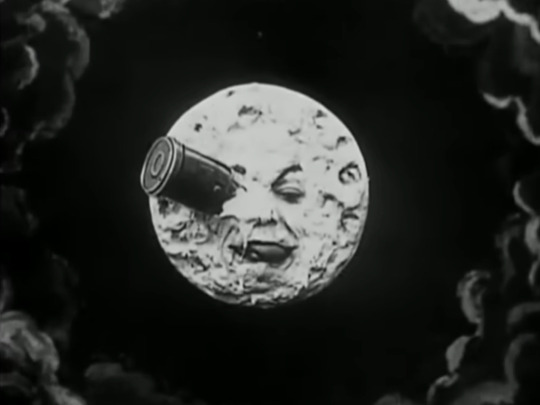
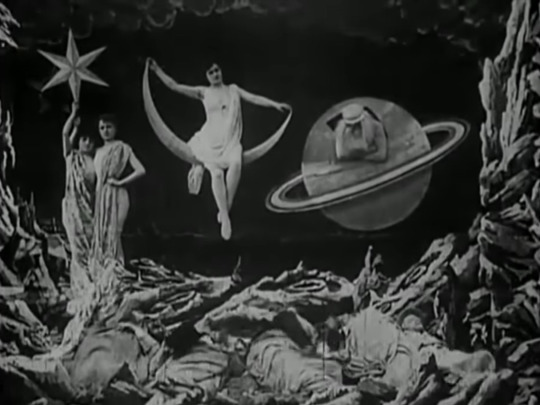
Stills from the silent short film Le Voyage Dans la Lune "A Trip to the Moon" (1902).
#cinematography#cinema#film lovers#film log#film review#films#film#film stills#movie lovers#movie log#movie review#movie night#movies#movie#movie stills#1900s#1900s movies#black and white#silent cinema#silent movies#short films#science fiction#sci fi#movies based on books#novels#jules verne#from the earth to the moon#le voyage dans la lune#a trip to the moon#george melies
90 notes
·
View notes
Text
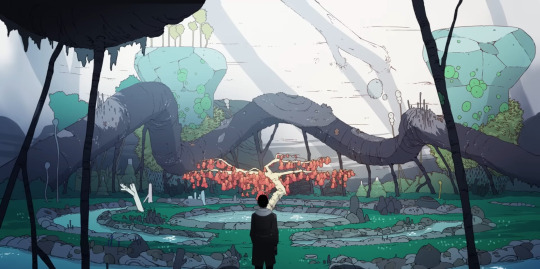
i just finished watching scavenger's reign yesterday, and let me tell y'all this is genuinely the best piece of sci-fi media i have seen in a long while, and it's insane how little i've seen this show being discussed online! it is probably the most unique and viscerally stunning series i’ve ever seen. the world that they have created is equal parts fascinating and terrifying, and every part of it feels fully realized. sci-fi is at its best when it lets go of nostalgia and explores the unknown, and SR gives me hope that real sci-fi can take root again, and be something beyond what came before it.
i will refrain from giving too much away in my discussion because this show works best the less you know going into it. the premise for this show is simple: crewmembers of a crashed freighter ship are left scattered across an alien planet. a good chunk of time has already passed by the time the show begins, and a few of the survivors have already established camps. however, things quickly spiral out of control as disaster wipes away their progress and forces each of them to move on. it's a harsh and unforgiving world that tests them each and every step of the way on their journey.
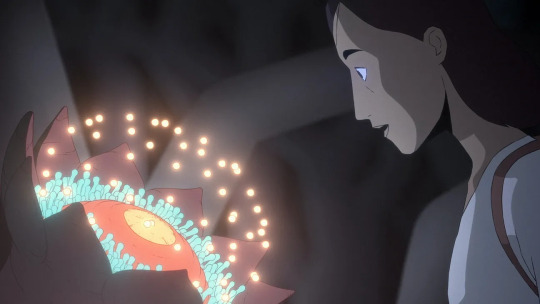
worldbuilding is where this show truly shines. it is no easy thing to design an entire ecosystem from scratch. it takes an insane amount of creativity and attention to detail to pull off what this show has. and my god did they fucking pull it off. living balloons floating through the air, large sea creatures that suck up their eggs when faced with danger, tendrilled plants that spawn clones of their prey to track them down - it is a frightening, surreal, and violent world, but harmonious in its own way. some creatures poison you, others clean off the poison. there are your typical type of predators that come at you with sharp fangs and giant pincers, but then there are predators that hunt via more insidious means: manipulating the memories of their prey to have them do their bidding, or hijacking their bodies from the inside. ultimately, the characters who fare best in this world are those who learn to adapt to it, and even sync with it.
SR also boasts a surprisingly well-crafted narrative. we are shown just enough of the world to keep us hooked, but it still feels like there is a lot left to be discovered. i also really enjoy the way the story is delivered to us. we follow the journeys of a few isolated groups whose paths gradually intersect. the characters are all fleshed out and three-dimensional - they were different enough to be unique and quirky, but never too different that it felt overboard. the way they react is exactly how humans in those circumstances would and should, the dialogue and voice acting were just superb. it felt so insanely real at times.
i really do hope that this show gets greenlit for a second season. this type of pure creative freedom is what we need right now. all in all, scavenger's reign is a gorgeous nightmare that you need to experience for yourself.
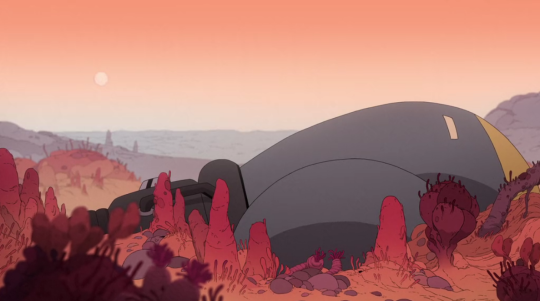
#scavengers reign#sr#review#recommendation#movie review#movie recommendation#show review#show recommendations#animation#scifi#science fiction#xenobiology#alien
541 notes
·
View notes
Text
Review: Final Girls by Mira Grant
Author: Mira Grant (Seanan McGuire)Publisher: Subterranean PressReleased: April 30, 2017Received: Own Goodreads | More Mira Grant Reviews Book Summary: Dr. Jennifer Webb has done the impossible. She’s created a piece of virtual reality technology so powerful that it can change our minds – literally. She’s using this technology to heal old psychological wounds – to do good. But she’s well aware…

View On WordPress
#Book#Book Review#Books#Fiction#Final Girls by Mira Grant#Horror#Horror Novel#Horror Review#Literary#Literature#Mira Grant#Review#Science#Science Fiction#Science Fiction Review#Seanan McGuire#Subterranean Press
7 notes
·
View notes
Text
Das Sternenfeuer von Antares

Ich streife mir mit letzter Kraft meine Handschuhe von den Händen und schleppe mich krallend über den staubigen, heißen Boden auf den Quanten–Integrator zu. Meine Schutzbrille vermag kaum noch meine Augen vor dem Licht der Sonne zu schützen. Jede einzelne Zelle meiner Haut scheint trotz Strahlenschutzanzug in Flammen zu stehen. Schweiß tropft über meine Stirn auf den Boden, wo er sofort verdampft.
Jetzt bereue ich es, meine Handschuhe ausgezogen zu haben, aber es war nötig, denn die Dinger waren gerade dabei, zu schmelzen. Es sind auch nur noch wenige Zentimeter bis zum Solar– Injektor; nur noch eine oder zwei Minuten durchhalten, Kip. Nur noch ein paar Herzschläge, Atemzüge und die letzten Augenblicke des Lebens ...
Über mir wird die Sonne von Biru zur Supernova, und ich werde das letzte Lebewesen auf dem Planeten sein, das noch atmen und denken konnte ...
[ PROLOG zu meinem ersten Science Fiction Roman "Das Sternenfeuer von Antares" ]
#science fiction#science fiction art#aliens#3d animation#science fiction review#blender 3d#außerirdische#3dartwork
1 note
·
View note
Text
Kingdom of the Planet of the Apes (2024) Review
300 years after the reign of Caesar, Noa, a young chimpanzee, embarks on a journey alongside Mae, a human woman, to find his kidnapped clan.Directed by Wes Ball, Kingdom of the Apes is a visually stunning addition to the Planet of the Apes franchise, though it falls short of reaching the heights of its some of its predecessors including the original.Accompanied by John Paesano’s score the film’s…

View On WordPress
#film review#Kingdom of the Planet of the Apes#Kingdom of the Planet of the Apes Review#movie review#review#science fiction#scifi
121 notes
·
View notes
Text
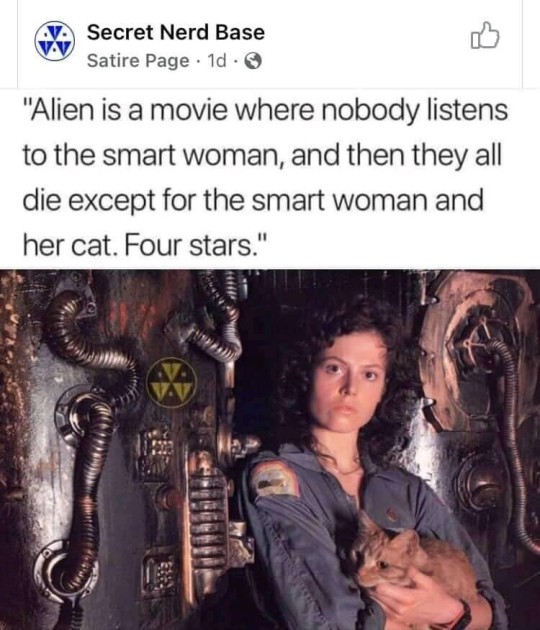
#ellen ripley#alien#aliens#alien 3#alien resurrection#movie#scifi#retro scifi#science fiction#review#anarchofeminism#anarchofeminist#cyberpunk#paranormal#extraterrestrial#supernatural#horror#horror movie#horror movies#movies#scifiseries#ausgov#politas#auspol#tasgov#taspol#australia#movie review#movie recommendation#movie reference
1K notes
·
View notes
Text
More Everything Forever

I'm on a 20+ city book tour for my new novel PICKS AND SHOVELS. Catch me at NEW ZEALAND'S UNITY BOOKS in AUCKLAND on May 2, and in WELLINGTON on May 3. More tour dates (Pittsburgh, PDX, London, Manchester) here.

Astrophysicist Adam Becker knows a few things about science and technology – enough to show, in a new book called More Everything Forever that the claims that tech bros make about near-future space colonies, brain uploading, and other skiffy subjects are all nonsense dressed up as prediction:
https://www.hachettebookgroup.com/titles/adam-becker/more-everything-forever/9781541619593/
Becker investigates the personalities, the ideologies, the coalitions, the histories, and crucially, the grifts behind such science fictional pursuits as infinite life-extension, space colonization, automation panic, AI doomerism, longtermism, effective altruism, rationalism, and conciousness uploading.
This is, loosely speaking, the bundle of ideologies that Timnit Gebru and Émile P. Torres dubbed TESCREAL (transhumanism, Extropianism, singularitarianism, (modern) cosmism, Rationalism, Effective Altruism, and longtermism):
https://en.wikipedia.org/wiki/TESCREAL
While these are largely associated with modern Silicon Valley esoteric techbros (and the odd Oxfordian like Nick Bostrom), they have very deep roots, which Becker excavates – like Nikolai Fyodorov's 18th century "cosmism," a project to "scientifically" resurrect everyone who ever lived inside of a simulation:
https://en.wikipedia.org/wiki/Nikolai_Fyodorov_(philosopher)
In their modern incarnation, these ideas largely originate in science fiction novels. That is to say, they were made up and popularized by people like me, the vast majority of whom made no pretense of being able to predict the future or even realistically describe a path from the present to the future they were presenting. Science fiction is something between a card trick and a consensual con game, where the writer shows you just enough detail to make you think that the rest of it must be lurking somewhere in the wings. No one in sf has ever explained how consciousness uploading could possibly work, and neither have any of the advocates for consciousness uploading – the difference is that (most of) the sf writers know they're just making stuff up.
Becker's central question is how many "smart" people (some of them very smart and accomplished, others merely very certain that they are smart despite all evidence to the contrary) can mistake futuristic allegories made up by pulp writers for prophesy?
In answering this question, he uncovers a corollary of Upton Sinclair's famous maxim that "it is difficult to get a man to understand something, when his salary depends on his not understanding it," namely, that "it is easy to get a person to believe something when doing so will make them feel good about themselves."
The beliefs that Becker explores in this book sometimes make the believers rich (like the AI grifters who run around shouting about AI taking over the world and turning us all into paperclips). Sometimes, they make their believers feel good about being selfish assholes (like longtermism, which holds that all the misery in the world today is worth it if you can make 24 heptillion hypothetical simulated people just a little happy in 10,000 years). Sometimes, they make their believers feel good about life after death, or eternal life – the same pitch that religions have been roping in followers with since the stone age.
What differentiates these beliefs from other faith-based claims is that their followers claim that they aren't operating on faith, but on science, reason and rationality. This is where the fact that Becker is a bona fide astrophysicist comes in. Not only is he personally qualified to debunk claims about space colonization, but he's also familiar with the rigorous process of scientific inquiry, and capable of consulting experts and listening to them. That's how he concludes, for example, that having your head cut off and frozen when you die is just a form of corpse mutilation, with a zero point zero zero zero zero percent chance of someone recovering your mind from your freezerburned brain.
Like his subjects, Becker has a complicated relationship with science fiction. He, too, enjoys the imaginative flights of the genre, its delightful thought-experiments, its gnarly moral conundra. I love these too. They make for a fascinating and often useful lens for understanding and challenging our own relationship with technology and our very humanity. Ultimately, Becker is exploring the difference between reading sf because it makes you think in new ways, and reading sf as a kind of prophetic text, and – crucially – he's asserting that it's perfectly possible to enjoy this stuff without organizing your moral life around hypothetical heptillions of virtual people living in the year 25,000; or, indeed, having your head cut off and frozen.

If you'd like an essay-formatted version of this post to read or share, here's a link to it on pluralistic.net, my surveillance-free, ad-free, tracker-free blog:
https://pluralistic.net/2025/04/22/vinges-bastards/#cyberpunk-is-a-warning-not-a-suggestion

#books#reviews#tescreal#accelerationism#singularitarianism#science fiction#oligarchy#tech bros#futurism#gift guide#adam becker
250 notes
·
View notes